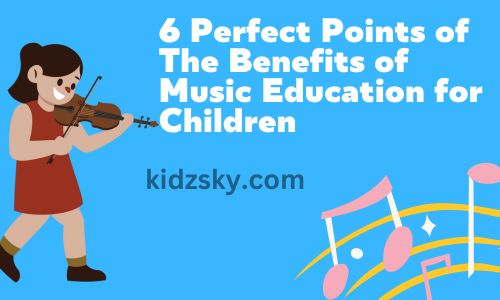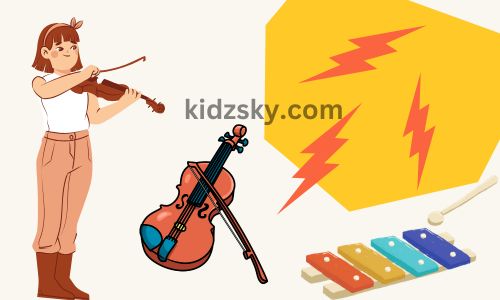Music education is more than just learning to play an instrument or sing a songThe Benefits of Music Education for children in multiple areas, from academic performance to emotional well-being
Whether through school programs or private lessons, incorporating music into your child’s life can bring numerous benefitsThis article will explore The Benefits of Music Education for Children and explain how it shapes their development.

6 Perfect Points of The Benefits of Music Education for Children
1Enhancing Cognitive Skills
One of the most significant Benefits of Music Education for Children is its positive impact on cognitive abilitiesLearning to read music, play an instrument, or sing requires both sides of the brain to work together
This helps children improve their memory, problem-solving skills, and critical thinkingStudies show that children exposed to music education often perform better in math and reading because they develop strong focus and analytical skills.
Music is, therefore, a creative outlet and an academic booster.
2Building Discipline and Patience
It takes time and effort to play well on an instrument or a songIt teaches children the values of discipline and patienceHow difficult it is to be seated each day to learn to play the right notes and coordinate hand movements, but through commitment, kids get to realize the products of their labor
What the person acquires in this process also surfaces in other activities of life, like in doing homework or sports, and makes them more patient and persistent
The Benefits of Music Education for Children go beyond the classroom—they extend into how kids approach everyday tasks with focus and dedication.
Our Latest Blog:- How to Build Strong Sibling Relationships: 8 Points with e.g.

3Boosting Emotional Expression and Confidence
Music is indeed an avenue for emotional expressionFor children who cannot voice out their emotions, they learn to vent out through music and dancing, or even singing.
Through music, they learn the skills to better handle feelings and develop a better relationship with their emotions.
More than any specific achievement or recognition, performing in front of an audience, no matter how small the group or the concert, builds confidence.
The level of satisfaction achieved by receiving recognition from others can really boost a child’s self-esteemThat satisfaction often translates into higher confidence levels in social settings as well as in academics.
There are many other ways children can gain through music educationOne of the most valuable strengths it helps develop is emotional strength: that is, self-expression and learning to cope with feelings.
4Improving Social Skills
Music teaching guides children working in groups, especially choirs, bands, or orchestrasThey learn how to listen and understand each other as well as follow signals toward creating something harmonious.
This social nature of instruction enhances communication skills, empathy, and cooperation.
In the context of a group music class, the children learn how to build and motivate each other as friendsThey may then extend their relationships beyond the walls of the classroom for stronger social circles.
Benefits of Music Education to Kids as a Social Activity: Much underappreciated but vitally crucial, this socialization activity allows kids to build relationships and increase their strong interpersonal skills.
Recently Published:- Benefits of Outdoor Activities for Kids: 6 Complete Guide

5Encouraging Creativity and Imagination
The beauty of music is that it’s one of the cleanest and purest forms of creativity since, during the composition of a song, improvisation on an instrument, or interpretation of a musical piece, children are able to think creatively, think outside the box, and really let their imagination go wild.
This kind of creative thinking is not just advantageous for artistic purposes but also applicable to problem-solving in other areas.
Music provokes the imagination of a child to become creative in other subjectsIt is a skillful ability that will sustain them far into adulthood.
6Helping with Motor Skills and Coordination
Playing an instrument can significantly assist in fine motor skills among little childrenMost instruments, such as the piano, violin, or drums, involve a child in hand-eye coordination and control of different parts of the body.
Physical skills, such as the control of fingers and hands so that the right sound is made, develop in children.
But besides the benefit of enhanced synchrony between body parts, such as hands and feet, when playing percussion instruments or dancing, music education builds coordination that may help children in any other sort of activity like sports or writing.
The Benefits of Music Education for Children in developing motor skills must be consideredIt lays a foundation for better physical development in other areas.
Read Kids Favorite:- Fun Indoor Activities for Kids: 5 Perfect during Rainy Days

Step-by-Step Guide for Parents and Teachers
Introducing music education into your child’s life does not have to be complicatedAnd so, how would it be possible for parents or teachers to help kids develop an appreciation for music step by simple step?
- Start Early
Expose children to music at a young ageThis can be as simple as playing classical or contemporary music at home, attending concerts, or singing songs together.
- Explore Different Instruments
Get children exposed to music as early as possibleIt may be in the form of listening to classical or contemporary music at home, attending concerts, or singing together.
- Enroll in Music Classes
- Create a Practice Schedule
Be sure to urge your child to practice regularly, but this should not become an exercise or a choreThey should develop a love for the craft, so this becomes an enjoyable part of their daily routineIt means the world that they practice daily for 10-15 minutes.
- Encourage Participation in Performances
Conclusion: The Lifelong Benefits
Music education is a gift that keeps on givingThe benefits of music education for children include infinite advantages, such as improving cognitive abilities and creating social relationships. By placing music in a child’s life, we help the child grow in far more ways than we could imagine.
Whether your child becomes a musician or not, music is sure to provide them with values and skills they will carry with them for the rest of their livesSo, encourage your child to learn more about music and let them have an abundance of fun with it.
We request that you share this blog, The Benefits of Music Education for Children, and spread the knowledge.
Admin creates all Photos used in this blog in Canva.




[…] Check also:- The Benefits of Music Education for Children: 6 Perfect e.g[…]
[…] Check also:- The Benefits of Music Education for Children: 6 Perfect e.g[…]